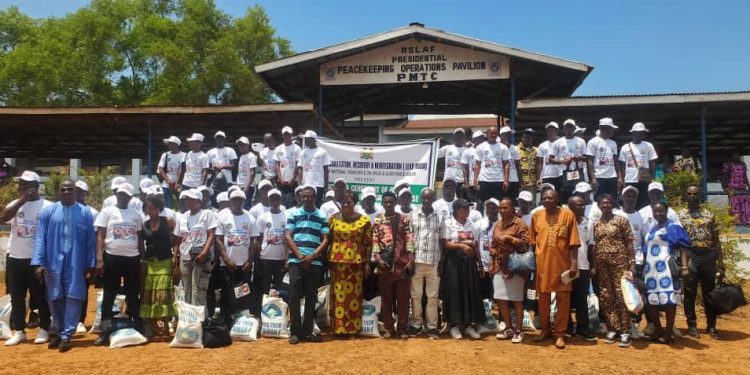In a powerful demonstration of hope and resilience, 52 former drug users were officially reintegrated into society today following the successful completion of an intensive eight-week rehabilitation program. The discharge ceremony, held at the Peace Mission Training Centre (PMTC) in Hastings, was organised by the Ministry of Social Welfare under its Pillar 4: Reintegration strategy, a cornerstone of Sierra Leone’s national response to drug abuse.
The event marks a critical milestone in the ongoing national effort to address the drug crisis, which President Dr. Julius Maada Bio declared a national emergency in 2024.
Speaking at the ceremony, Professor Sahr Foday, Executive Director of the National Public Health Agency and Chairperson of the National Taskforce on Drugs and Substance Abuse, emphasised the government’s holistic approach to the crisis.
“Through prevention, rehabilitation, law enforcement, and community engagement, we are seeing tangible results,” he affirmed.
The 52 individuals discharged—49 males and 3 females—represent a beacon of hope in the country’s multi-sectoral fight against substance abuse.
Colonel Abdul Baba Keita, Commandant of the PMTC, reported a historic achievement: all 52 participants completed the program without any escape incidents, a testament to their commitment and the centre’s effective rehabilitation model, which combined structured routines, medical support, and nutritional care.
The Minister of Social Welfare, Hon. Melrose Karminty, in her keynote address, outlined comprehensive post-rehabilitation support initiatives. Graduates will be designated as “Ambassadors of Positive Change,” and will benefit from:
Educational reintegration through partnerships with the Ministry of Education
Access to vocational training programs
A dedicated WhatsApp helpline to address discrimination
Starter packs containing 10kg rice bags, hygiene kits, and other essentials
“These individuals have demonstrated remarkable strength,” said Minister Karminty. “It is now our collective duty as a nation to support their new journey and to erase the stigma surrounding addiction recovery.”
The atmosphere was charged with emotion, as many parents who had once feared for their children’s futures wept tears of joy. Minister Karminty urged families and communities to welcome the rehabilitated individuals with open arms, saying,
“Do not dwell on their past. This is a new beginning.”
The ceremony concluded with an invitation to a special interfaith service on April 27, which will provide ongoing spiritual support for the rehabilitated individuals.
Professor Foday aptly captured the spirit of the day:
“Today, we do not just see former users – we see future leaders in our fight against substance abuse.”
Credit: Abu Bakarr Sama













